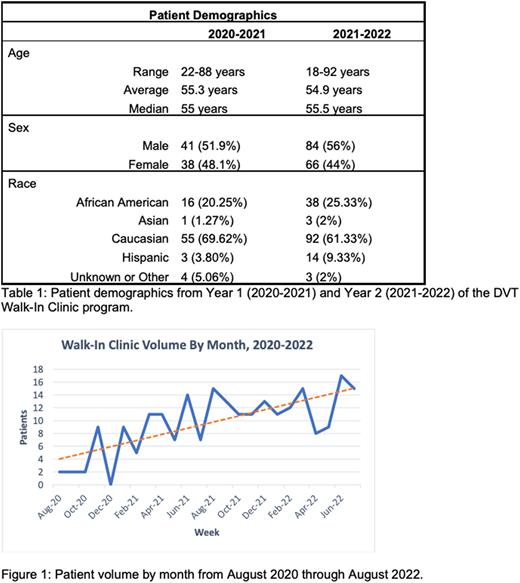Abstract
BACKGROUND: Evidence supports treating most patients with venous thromboembolism (VTE) as outpatients. There is hesitancy among some healthcare providers to manage patients with these high-risk acute conditions, on high-risk medications, without close and reliable follow-up. In the era of direct oral anticoagulants (DOACs), the financial complications associated with appropriate anticoagulation further complicate management. The benign hematology group at the University of North Carolina (UNC) at Chapel Hill developed an Advanced Practice Provider (APP)-led clinic to address this area of need, aiming to improve efficacy and safety in the outpatient setting for patients with acute VTE.
METHODS: An APP-led acute VTE clinic, "Walk-In DVT Clinic", located within Benign Hematology was established with one appointment reserved each weekday. Patients with newly diagnosed VTE can be referred by any UNC-affiliated provider. A triage system with direct pager and phone line ("1-DVT") is available during business hours. For patients referred after-hours through the Emergency Department (ED), direct scheduling is available 24 hours/day. Patients are seen by the APP (physician assistant or nurse practitioner) with hematologist oversight. Pharmacist support is available for questions about drug interactions, medication access, and other needs. Patient education and counseling on diagnosis and anticoagulation is provided. Patients are evaluated for risk factors which contributed to the VTE, and follow-up for longer-term discussion of anticoagulation plans is scheduled. Following appointment, patients have access to nurse and provider assistance for bleeding complications, anticoagulation management for surgical/procedural planning, medication access, or other complications. Here we present demographics and referral data for patients seen in the first two years.
RESULTS: Since initiation, a total of 234 patients have been seen, of which data was available for 229. Specifically, 84 in the first year (8/24/20 through 7/31/21) and 150 in the second year (8/1/21 through 7/31/22). Of these, 72% were ED referrals, and 12.7% required financial assistance of some kind. In the second year, 59.3% of referrals were ED, and 10% required medication assistance of some kind. Patient demographics are listed in the table below. In the second year, significant changes in medical plan (examples: dose errors, misdiagnosis) were identified in 19 cases (12.67%). The median time to appointment in the first year was 4 days and in the second year was 5 days (including weekend days).
DISCUSSION: The "Walk-In DVT” clinic grew quickly in its first year and continued to grow in the second year, nearly doubling in utilization. In the first year, time-to-visit median was 4 days, and the program's aim was to decrease this. However, with increased utilization, this metric increased to 5 days. As a consequence, a second APP has been hired to improve access.
The types of providers referring to the clinic diversified, with more referrals from surgical and medicine specialties and a lower overall percentage of ED follow-ups. This finding supports progress in one goal of the clinic, to have providers who diagnose a VTE refer directly to the DVT Walk-In Clinic rather than send them to the ED. Expanding the network of outpatient providers using the clinic is a future goal. The demographics of patients showed an increase in use by African American and Hispanic patients. Importantly, the increase in Hispanic patients has highlighted the need for better patient education materials translated to Spanish, prompting efforts to produce and translate new materials.
In summary, since its inception, the APP-led "DVT Walk-In Clinic” has grown in utilization, diversity of referrals, and diversity of patients served, with new focus on patient education tools and expanding access.
Disclosures
Frank:Pfizer: Honoraria. Key:Biomarin: Membership on an entity's Board of Directors or advisory committees; uniQure / CSL Behring: Consultancy, Membership on an entity's Board of Directors or advisory committees, Research Funding; Novo Nordisk: Membership on an entity's Board of Directors or advisory committees. Moll:Diagnostica Stago: Honoraria.
Author notes
Asterisk with author names denotes non-ASH members.


This feature is available to Subscribers Only
Sign In or Create an Account Close Modal